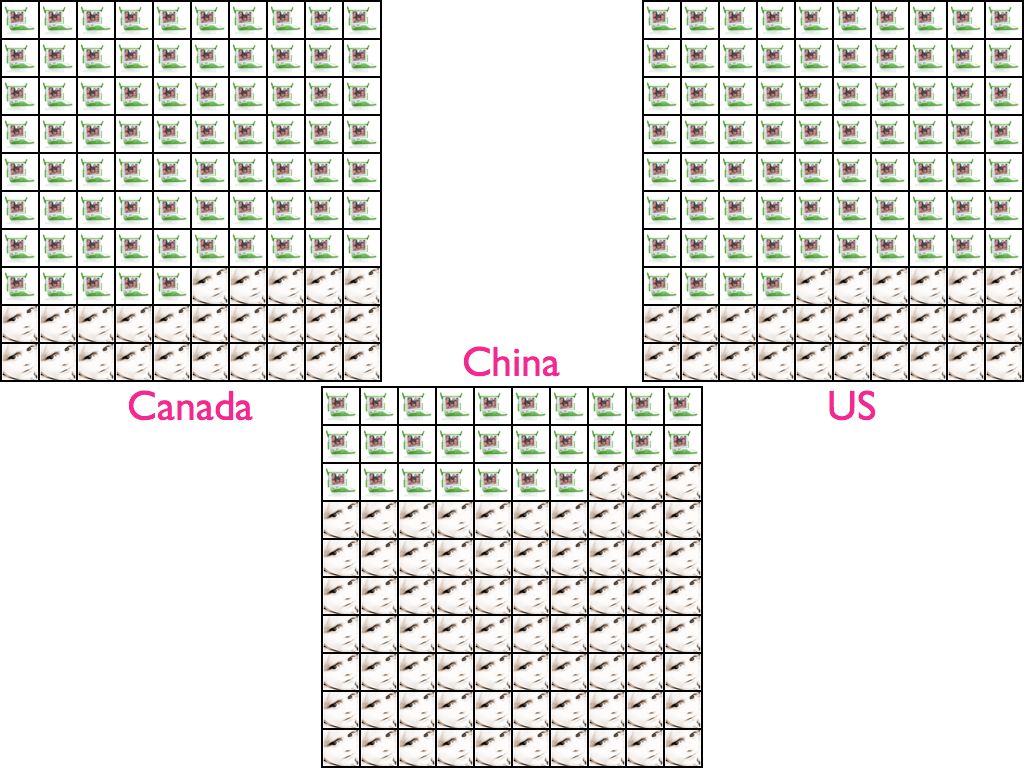This video shows the evolution of special effects in cinematography. Because the movie studios are often at the edge of computer graphics work, it illustrates the evolution of 100 years of technology.

Credit: flickr / takomabibelot, flickr / Kuzeytac ( So, SO busy…), flickr / HuTDoG83
Through human history, there have been various inventions and discoveries that have fundamentally changed things.
The first was probably fire – it’s suggested that the reason for the sudden growth in the size of the human brain was a result of early humans cooking meat.
Another was the printing press, which allowed for the easier sharing and distribution of information. Before the printing press, everything was hand-written – very time consuming. The church got very angry about this development, and tried to fight against it but ultimately they couldn’t stop the advance of technology. To show how utterly futile this attempt was, consider that in order to get enough copies of their reasons why the printing press was such a terrible thing, they had to use the printing press – because scribes couldn’t copy fast enough. We see similar reactions today from some industries and some religious organizations when it comes to the internet.
The combustion engine brought about great changes in production and human mobility. It’s made it possible to flit between continents, the way we take for granted today.
Taken by me at the Museum of Science and Technology, Tokyo, Japan
The internet is another such invention, and we’re just at the beginning of the changes that will ensue.

We can see here that the internet was created about 40 years ago, and email shortly after. The internet as we know it really starts with the invention of the “World Wide Web” over 20 years later, though. The internet is the infrastructure, and the web is the software that runs on top of it. Many people don’t understand the difference, but without the web the services like YouTube, Wikipedia, Facebook, and Twitter would not be possible. Now, we’re at the start of the mobile web – by 2020 it’s predicted that more mobile devices will be accessing the internet than computers.
Credit: flickr / just Luh.
My childhood would probably be unrecognizable to children of today – No cellphones! No iPod! No DVDs! (instead there was VHS) No YouTube! No Facebook! No Twitter! My family didn’t have a computer until I was about 12 and it was very slow, and at first it didn’t have internet.
For previous generations, the differences weren’t this huge – they were, as I understand it, mostly differences in TV programs. However with things moving so fast, this has not been the case lately.
Credit: flickr / KhE 龙, flickr / hichako, flickr / macwagen, Wikipedia
The giant brick cellphone on the left? My dad had one of those when I was little! I remember the first iPod, “Dial up” internet, floppy disks, my first CD and DVD and (vaguely!) what using the internet was like before Google.

Figures from http://www.internetworldstats.com/stats.htm
Images credit: flickr / Wayan Vota, flickr / Pink Sherbet Photography
In Canada, about 75 people out of every 100 use the internet. In the US, 74 people out of every 100 do. In China, which is a developing country, just 27 people out of every 100 use the internet. Number like this are why I can say with confidence that the changes we see as a result of the internet and other advances in technology are just beginning. When the whole world is online, the world will be very different than it is now.
China is still ahead of the worldwide average, which is just 25.5 people out of every 100. We have a long way to go before the whole world is connected, but I think we’ll get there.
Old style blog design from http://www.shirky.com/
One of the huge changes that programmers have brought about, through the creation of software, is the possibility for everyone to create content. This is so new, because if you think about it – before we used to distribute everything in books and newspapers etc, which have much higher costs of distribution. This development is something that impacts many people every single day.
The content users could create used to look a little… plain and dull and required some know-how.
Credit: Kevin Cornell, Markus Zeeh, Veerle Pieters, Oliver Wagner, Roman Leinwather, Manuela Hoffmann, Nick La, Pedro Vitor Lamin Júnior, Design Disease
Now, very little knowledge (if any) is required and designers can create beautiful looking web pages, that showcase their artistic sensibilities as well as their content.
In fact, the creators of I Want You To Want me used blog content to make another installation – this one online – called “We Feel Fine”.
Credit: flickr / Steven2005
So there’s a lot of stuff that’s going to change, and one of those things we can say with a good degree of certainty, is that newspapers are going to die out. Some of the brands will remain, but we’ll access them in a different way than on giant pieces of paper.
Some people are getting very angry about this, but it’s pointless to cling onto a dying business model. Innovative companies will survive. Those who waste time complaining probably won’t.
Credit: Wave Screenshot, flickr / Meddy Garnet, flickr / Joe Wilcox, Apple Tablet Image
But innovation doesn’t just mean the destruction of old things, there will also be new things that are created. Tactile computing, like tablets and tables will become mainstream. Communications will evolve through services like Google Wave. And eventually we’ll have house cleaning robots! (Sooner the better!)








